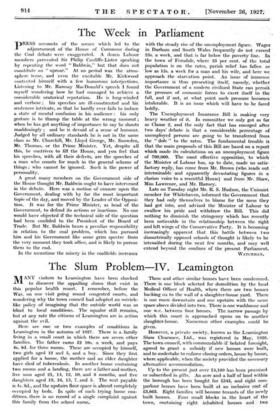The Week in Parliament
DRESS accounts of the scenes which led to the adjournment of the House of Commons during the Coal debate were exaggerated. A dozen Labour members prevented Sir Philip Cunliffe-Lister speaking by repeating the word " Baldwin," but that does not constitute an " uproar." At no period was the atmo- sphere tense, and even the excitable Mr. Kirkwood contented himself 'with a few humorous interjections. Listening to Mr. Ramsay MacDonald's speech I found- myself wondering how he had managed to achieve a considerable oratorical reputation. He is long-winded' and verbose ; his speeches are ill-constructed and his sentences intricate, so that he hardly ever fails to induce a state of mental confusion in his audience : his only gesture is to thump the table at the wrong moment ; when he has got anything of importance to say he shouts maddeningly ; and he is devoid of a sense of humour. Judged by all ordinary standards he is not in the same class as Mr. Churchill, Mr. Lloyd George, Mr. Snowden, Mr. Thomas, or the Prime Minister. Yet, despite all this, he contrives to fill the House, and you feel that his speeches, with all their defects, are the speeches of a man who counts for much in the general scheme of things ; who cannot be ignored. Such is the power of personality.
A great many members on the Government side of the House thought Mr. Baldwin ought to have intervened in the debate. Here was a motion of censure upon the Government, dealing with by far the most important topic of the day, and moved by the Leader of the Opposi- tion. It was for the Prime Minister, as head of the Government, to defend its actions or inactions. No one would have objected if the technical side of the question had been confided to the President of the Board of Trade. But Mr. 'Baldwin bears a peculiar responsibility in relation to the coal problem, which has pursued him and his Government like some grim spectre from the very moment they took office, and is likely to pursue them to the end. - In the meantime the misery in the coalfields increases with the steady rise of the unemployment figure. Wages in Durham and South Wales frequently do not exceed 25s. a week, and that is far below the poverty line. In the town of Ferndale, where 25 per cent. of the total' population is on the rates, parish relief has fallen as 'low as I5s. a week for a man and his wife; and here we approach the starvation point. An issue of immense importance is thus presenting itself, namely, whether the Government of a modern civilized State can permit the pressure of economic forces to exert itself to the full, and if not, at what point such pressure becomes intolerable. It is an issue which will have to be faced boldly.
The Unemployment Insurance Bill is making very heavy weather of it. In committee we only got as far as Clause 2, and the only fact that has emerged after two days' debate is that a considerable percentage of unemployed persons are going to be' transferred' from the " dole " to the rates. The fundamental trouble is that the main proposals 'of this Bill are based on a report which made its calculations on an unemployment figure of 700,000. The most effective opposition, to which the Minister of Labour has, up to date, made no satis factory reply, has come from Mr. Brown (who reads out - interminable and apparently devastating figures in a clarion voice to a resentful. House) and from Mr. Shaw, Miss Lawrence, and Mr. Harney.
Late on Tuesday night Mr. R. S. Hudson, the Unionist member for Whitehaven, informed the Government that they had only themselves to blame for the mess they had got into, and advised the 'Minister of Labour to swallow his pride and withdraw the Bill. This did nothing to diminish the stringency which has recently been noticeable in the relationship between the right and left wings of the Conservative Party. It is becoming increasingly apparent that this battle between two diametrically opposed schools of thought is likely to be intensified during the next few months, and may well extend beyond the confines of the present Parliament.
WATCHMAN.






















































 Previous page
Previous page